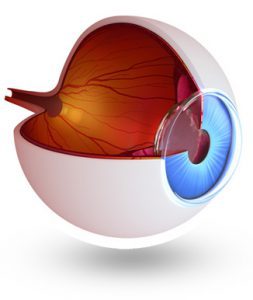OCULAR DISEASE AND TREATMENT
Our eye doctors regularly diagnose and treat a wide variety of eye problems. In addition to the routine services we provide, our eye doctors treat eye infections, remove ocular foreign bodies, manage chemical insult and eye trauma, diagnose and treat glaucoma, diagnose cataracts, and co-manage surgical patients.
Our patients are comforted by the fact that our eye care clinic is able to handle a majority of problems they may have with their eyes and vision.

Cataracts
Cataracts are one of the most common and treatable eye conditions. Cataracts occur when the lens, which sits just behind the iris or colored part of the eye, becomes cloudy. Light which would normally pass through this lens directly, is now scattered and the image collected by the retina is blurred and distorted.
Cataracts are a fact of life for all of us. Nearly everyone will have to deal with cataracts at some point in our lives. Luckily, the treatment for cataracts by an eye doctor is now very straightforward and recovery time is generally short. Gone are the days of eye patches, immobilization, and lengthy recovery. The treatment for cataracts is surgical removal of the clouded lens and replacement with a synthetic, clear lens. Most procedures are performed in minutes and without stitches at our eye care clinic!
Many exciting new technological advancements have occurred in these replacement lens designs as well as in the surgical techniques used. There now are designs which integrate astigmatism and bifocal correction into the lens implant. Our eye doctors have been extensively trained in the co-management of this new technology.
We happily educate each of our cataract patients in Chesapeake, Virginia Beach and Norfolk on the options available to them and how their insurance coverage applies to the cost of the procedures.
Glaucoma
Glaucoma is an eye disease which causes destruction of the optic nerve fibers. This damage is typically caused by increased pressure inside the eye and can lead to blindness if not treated by an eye doctor. If this condition is properly detected and treated in a timely manner, it is most often successfully treated with prescription eye drops to lower the intraocular pressure.
Glaucoma is the 2nd leading cause of preventable blindness in the United States.
Most likely, this is due to the fact that in the early stages of glaucoma, the patient experiences no symptoms. There is no pain or blurry vision typically associated with the early onset of glaucoma. Therefore, it is extremely important to have annual eye exams so that we can monitor for any signs of this condition.
At Gontarek Eye Care, we have invested heavily in the equipment and expertise required to accurately diagnose and treat glaucoma in a timely manner so that we may help to preserve your vision! Our eye care clinic uses the industry standard Humphrey visual field unit to detect subtle loss of vision. We also utilize the Zeiss GDx scanning laser polarimeter to detect even subtle damage if the optic nerve caused by glaucoma.
We also digitally image the appearance of the optic nerves to assess physical changes over time. These technologies enable us to accurately diagnose, treat, and track this disease with confidence.
Diabetic Eye Disease
Patients with diabetes are especially vulnerable to eye disease. Our eye doctors recommend a dilated eye examination at least once a year for our patients with diabetes as is the standard set by the American Diabetes Association, the American Medical Association, and the American Optometric Association.
The most commonly observed ocular complication due to diabetes is diabetic retinopathy.
Diabetic retinopathy is seen when blood vessels inside of the eye become leaky. As a result, blood, fluid, and proteins can collect on top of and underneath the retina causing a myriad of visual problems.
In fact, diabetic retinopathy is a leading cause of blindness in persons under the age of 65. Often, in the early stages of retinopathy, the patient’s vision is not affected.
Therefore, prevention and early detection are critical in maintaining good vision.
Our eye clinic utilizes retinal imaging systems to track signs of diabetic retinopathy. This allows us to determine if and when more specialized or surgical care is needed. Information about your eye health is communicated to your primary care physician to allow more efficient and prompt management of your diabetes.
